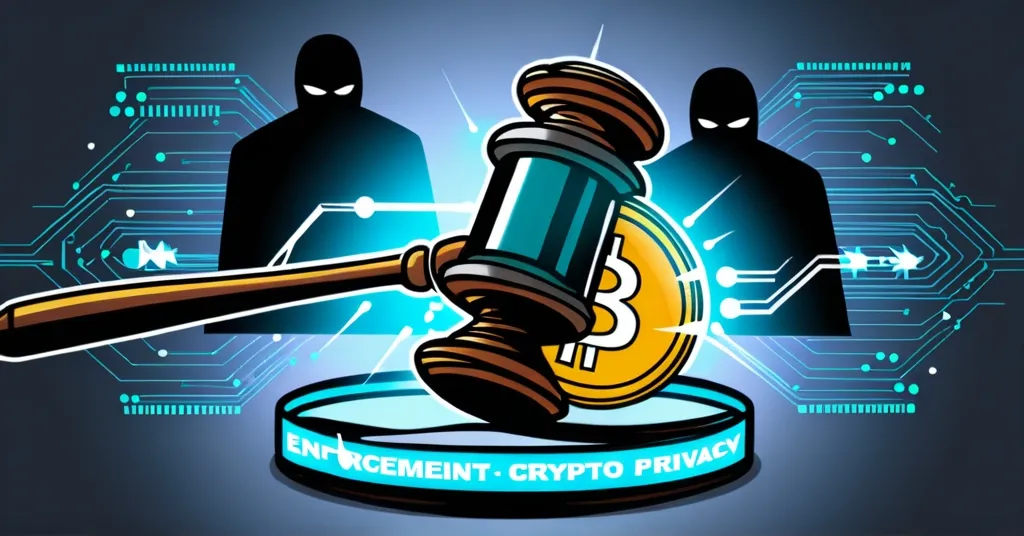UK Court Seizes $4.3M Bitcoin from Criminal Kingpin, Raising Privacy Concerns

UK Court Seizes $4.3 Million in Bitcoin from Criminal Kingpin Alexander Surin Amid Legal Scrutiny
A UK court has seized over $4.3 million in Bitcoin from Alexander Surin, known as “Don Car-Leone,” highlighting the growing prowess of law enforcement in tackling cryptocurrency crimes. This seizure raises significant questions about the privacy and security of digital currencies, underscoring the tension between their potential for misuse and the ideals of decentralization and freedom.
- UK court seizes over $4.3 million in Bitcoin from Alexander Surin
- Part of broader efforts to combat cryptocurrency-related crimes
- Raises concerns about privacy and security of cryptocurrencies
The Seizure Details
The UK High Court’s action against Surin marks a pivotal moment in the fight against cryptocurrency-related crimes. Surin, a notorious figure linked to various criminal activities, was the target of an international effort to curb the misuse of digital assets. His Bitcoin stash, amounting to over $4.3 million, was seized, demonstrating the relentless pursuit of justice even in the seemingly anonymous realm of cryptocurrencies. This case serves as a testament to the effectiveness of legal systems in tracking and confiscating digital assets when used for illicit purposes. For further details on the case, refer to UK court Bitcoin seizure Alexander Surin case details.
Privacy Concerns
While cryptocurrencies like Bitcoin promise decentralization and privacy, the Surin case exposes vulnerabilities within the crypto space. Law enforcement agencies are now equipped with tools that trace transactions on the blockchain and leverage international cooperation to pierce through the veil of anonymity. Using these tools, authorities can follow the trail of digital assets, raising critical questions about the true privacy and security that cryptocurrencies offer. For instance, blockchain analytics—a method used to track transactions on the blockchain—has become increasingly sophisticated, allowing law enforcement to map and seize illicit funds.
Broader Implications
As champions of decentralization, freedom, and privacy, we must confront the harsh reality that cryptocurrencies are a double-edged sword. They empower individuals to disrupt the status quo, but they also attract those who seek to exploit these technologies for nefarious purposes. The Surin seizure is a stark reminder that the crypto community must remain vigilant and proactive in addressing these challenges. We advocate for effective accelerationism (e/acc)—driving forward the adoption of decentralized technologies—but we must ensure that the crypto space remains a bastion of freedom and privacy. This means fostering a culture of responsibility and transparency, where the benefits of these technologies are maximized, and their potential for misuse is minimized. For more insights into the impact of such seizures, see Impact of cryptocurrency seizures on privacy and security in the crypto community.
Although we lean towards Bitcoin maximalism, recognizing its pivotal role in the financial revolution, we also acknowledge the unique contributions of altcoins and other blockchain systems. Ethereum and other innovative protocols fill niches that Bitcoin may not, and they too must navigate the complex landscape of privacy and security. For example, projects like Monero and Zcash prioritize anonymity and privacy, yet they still face similar challenges in maintaining security against law enforcement efforts. For further discussion on privacy concerns related to this case, check out Bitcoin privacy concerns Alexander Surin case reddit.
Key Questions and Takeaways
- What does the seizure of Bitcoin from Alexander Surin indicate about law enforcement’s capabilities?
The seizure demonstrates the growing effectiveness of law enforcement in using blockchain analytics for tracking illegal transactions to track and confiscate cryptocurrencies used in criminal activities. Tools such as Chainalysis Reactor help map transactions and identify criminal entities, showcasing the sophistication of these methods.
- How might this seizure impact the broader cryptocurrency community?
It may raise concerns about privacy and security, as it shows that even pseudonymous transactions can be traced, prompting the community to advocate for better security measures and transparency. The crypto community must consider how to balance the benefits of decentralization with the need for robust privacy protections. For more on this, visit Impact of cryptocurrency seizures on privacy quora.
- What are the broader implications for the use of cryptocurrencies in illegal activities?
The case suggests that the use of cryptocurrencies for illegal activities is becoming riskier due to improved law enforcement tools, potentially deterring criminals and encouraging the development of more secure and transparent systems. As such, ongoing projects aimed at improving cryptocurrency security are crucial in addressing these concerns. For a comprehensive overview, refer to UK Court Seizes $4.3 Million in Bitcoin from Criminal Kingpin Alexander Surin Amid Legal Scrutiny.
Looking Ahead
As we navigate this complex landscape, our focus remains on a financial revolution that empowers individuals, disrupts the status quo, and upholds the values of freedom and privacy. But let’s also be real about the challenges we face, because in the world of crypto, there’s no room for bullshit. The Surin case is a wake-up call for the crypto community to prioritize security and privacy while continuing to push the boundaries of what’s possible with decentralized technologies. For additional background on Alexander Surin, see UK Court Bitcoin seizure Alexander Surin wiki.



